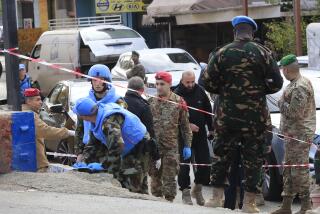Another Somali Tragedy: CARE Guard Is Killed
- Share via
MOGADISHU, Somalia — The last, violent minutes of Awil Hersi Salawaad’s life illustrate what has become of the good intentions of the foreign military intervention in Somalia.
Salawaad, 65, chief security officer for CARE International here, left the food distribution agency just before noon Monday to buy water from a sidewalk vendor and pick up some medicine at a pharmacy. At the pharmacy door, Salawaad was killed by machine-gun fire from a passing patrol of Malaysian U.N. peacekeepers, according to Somali witnesses.
The incident took place in one of the most congested areas of the capital. According to U.N. officials, the Malaysians heard two sniper shots fired at their convoy of four armored vehicles, so the troops opened fire with automatic weapons. Witnesses said the Malaysians killed Salawaad and wounded at least six other people, including another CARE security guard.
The U.N. contingent defended the Malaysians’ actions as falling within the “rules of engagement” that allow the peacekeepers to fire their weapons. “We don’t have to be shot at to shoot first,” said U.S. Army Maj. David Stockwell, the U.N. military spokesman. He said the Malaysians reported taking fire from two Somali snipers, and “when we see gunmen, we engage.”
“It’s regrettable if innocent people are wounded or killed,” Stockwell said, “but that’s just the way it is.”
The real tragedy of Salawaad’s death, according to many Somalis here, is that Monday’s violence was far from an isolated incident. Hundreds, if not thousands, of Somali civilians are believed to have been killed here in cross-fire during four months of fighting between U.N. troops and the militia of Mohammed Farah Aidid. Their deaths have hardly been acknowledged.
At a briefing about the incident, Capt. Tim McDavitt of New Zealand, the deputy U.N. spokesman, initially said nothing about Somali casualties. He said only that “there were no Malaysian casualties in the exchange” between the peacekeepers and the two snipers he said were firing on them.
Asked about Salawaad’s death, McDavitt said, “I understand it was the result of Somali-on-Somali violence.”
More to Read
Sign up for Essential California
The most important California stories and recommendations in your inbox every morning.
You may occasionally receive promotional content from the Los Angeles Times.











